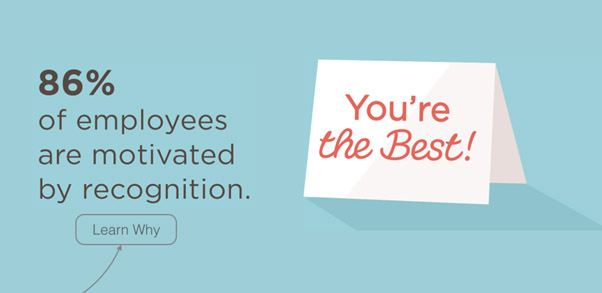
Nowadays, leading in most modern organisations involves the management of knowledge workers, i.e. a highly educated workforce. Nowadays 7 out of 10 tasks are based upon a person’s emotional intelligence not their IQ. How do we develop this part of our intelligence? Why does it lead to better engagement and motivation of employees? How does recognition motivate?
Feeling engaged and motivated at work is a direct result of feeling like belonging to somewhere. But what is it that encourages people to become more engaged with their work?
Recognise
The answer may lie within the 5 recognised elements of employee engagement; Purpose, Culture, Autonomy, Rewards and Recognition. Of these 5 elements, 86% of employees are motivated by just one: – Recognition. If you were to stop and ask yourself, do you get recognised yourself enough or do your own team’s efforts get recognised enough. What would the answer be? In my experience, recognition is directly linked to how motivated a person is at work. But, it may be that you or your boss are uncomfortable recognising or rewarding effort. If so it might be worth taking some time out to develop some different elements of leadership and management skills.

Emotions have been described as energy in motion, so it makes sense to learn what drives emotion. This is where EQ comes in. EQ (Emotional intelligence) is intelligence you possess which allows you to both lead and work alongside people in a team more effectively. A person’s EQ is about understanding emotion, whereas IQ is more about understanding information. We use EQ to decipher emotional information in order to guide our thinking and behaviour. An example of an emotionally intelligent leader would be someone as having the capacity to listen well and take into account other people’s feelings and circumstances before communicating their message or making a decision (empathy), but emotionally intelligent leaders are also comfortable challenging the views of others and give clear messages (straightforward). Knowing when to use which style is the key to being a successful leader.
Collective Goals
EQ has taken off in business management circles as it is seen as a method of delivering better organisational productivity and is sometimes referred to as emotional capital. Successful leaders who possesses emotional capital have the ability to influence the behaviour of others toward positive outcomes. Developing these leadership’s skills enables you to effectively gain the support and commitment of others in achieving collective goals – together. It’s not just the leader in the group but everyone on your team should be developing their own EQ competencies of which there are 10 recognised elements: Self-Knowing Self-Confidence, Self-Reliance, Self-Actualisation, Straightforwardness, Relationships Skills, Empathy, Self-Control, Adaptability and Optimism.

Developing your own EQ is one way recognition at work can be addressed and ultimately it is what makes for a better engaged workforce. But it’s not as easy as it sounds. If you want to involve and bring everyone on the team with you, you must first get permission to lead the team, from your team.
